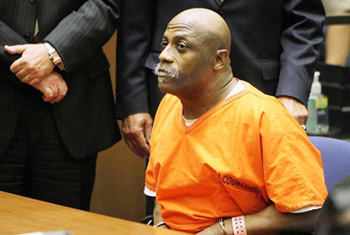A transient with a long criminal history pleaded guilty to murder Friday and was sentenced to life in prison for kidnapping and killing a 17-year-old girl after she failed to withdraw cash from an automated teller machine with a credit card.

Charlie Samuel is sentenced to life in prison without the possibility of parole for the murder of Lily Burk. In court, he said to her family, "I pray to God that you may forgive me one day." (Gina Ferazzi, Los Angeles Times / May 27, 2009)
The plea agreement with prosecutors spared Charlie Samuel a possible death sentence for the killing of Lily Burk, whose body was found last year inside her car in a downtown Los Angeles parking lot. Her neck had been slashed and her head beaten.
Wearing orange jail scrubs and shackled to a waist chain, Samuel, 50, stood in court and said he hoped Burk's family would forgive him. Friends and family of the girl - including her parents - sat quietly in the front row.
"I'd like to deeply, truly apologize to the family for the grief I've caused them for the loss of their child," Samuel said. "I pray to God that you may forgive me one day."
Immediately after Samuel finished, Los Angeles Superior Court Judge David S. Wesley sentenced him to life in prison without the possibility of parole.
"There are no words that you can say that can substitute for the loss you've created," Wesley told him.
The 5-foot-2 Burk went missing July 24 while visiting Southwestern Law School in the Westlake area of the city as she ran an errand for her mother, a lawyer who taught at the school.
Samuel was on parole and enrolled in a residential drug treatment center south of Koreatown. On the same day, he obtained permission to leave the facility so that he could visit a Department of Motor Vehicles office, even though the office was closed.
Authorities said surveillance cameras showed Samuel driving Burk's black Volvo away from the area of the law school with the high school student in the front passenger seat.
Surveillance images from a downtown ATM later showed Samuel, a burly bald man, with an arm tightly around Burk, a petite teenager in a sundress. Burk made two calls to her parents asking how to use a credit card to withdraw money from an ATM but never mentioned the abduction and did not sound panicked.
About an hour later, video footage showed Samuel walking away from a parked black Volvo, where authorities later found Burk's body. A fingerprint found on a soda can in the Volvo matched Samuel's. A bloodstain on the shirt he was wearing at the time of his arrest contained DNA that matched Burk's.
Prosecutors Deborah Brazil and Alan Jackson said the crime resonated beyond those who knew and loved the teenage girl.
"Any one of us could see it could happen to any of us or any of our children," said Jackson, assistant head deputy of the district attorney's major crimes division.
Burk's parents, Greg Burk and Deborah Drooz, issued a statement after Friday's sentencing hearing thanking police and prosecutors and saying they were "satisfied that justice has been served."
"We're grateful that the criminal-justice phase is at an end and we can move forward with love for Lily in our hearts," they said.
Ben W. Pesta, one of Samuel's defense attorneys, said he believed the district attorney's office would have sought the death penalty had his client not pleaded.
"I think we saved a life today," he said outside the courtroom.
Samuel, he said, experienced a "Dickensian" upbringing. As a 6-year-old boy, he watched his mother die of alcoholism, vomiting blood on the family's couch. He and his siblings were shuttled from relative to relative, Pesta said. At 15, he saw an uncle beat his aunt to death.
Samuel began using drugs and alcohol as a child. Though he has a criminal record that stretches back more than two decades, Samuel managed to spend some periods out of trouble when he wasn't using drugs or alcohol, Pesta said.
Pesta said he believed Samuel used crack cocaine and was drinking alcohol the day Burk was murdered. He said his client might also suffer from brain damage that could impair his judgment and impulses, possibly the result of a serious car accident when he was a child or from using drugs.
Samuel's criminal record involved mostly minor theft and drug crimes, but also included a robbery that bore a striking resemblance to the abduction of Burk.
In 1986, he was accused of kidnapping an elderly man in San Bernardino, driving the man's car to an ATM, and striking the victim when no money appeared. Samuel pleaded guilty to robbery, residential burglary and car theft and was sentenced to six years in prison.
The crimes later made him subject to a life sentence under the state's 1994 three-strikes law when he was convicted of committing new felonies, including second-degree burglary in 1997 and petty theft in 2006. But a clerical error on his rap sheet led prosecutors to mistakenly think he had only one strike conviction, not two.











